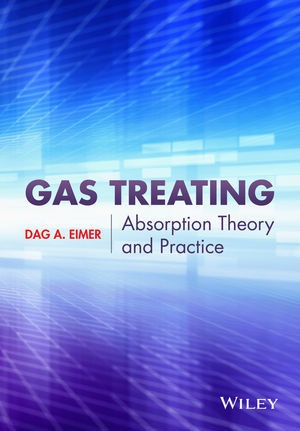Mehr lesen
Gas Treating: Absorption Theory and Practice provides an introduction to the treatment of natural gas, synthesis gas and flue gas, addressing why it is necessary and the challenges involved. The book concentrates in particular on the absorption-desorption process and mass transfer coupled with chemical reaction.
Following a general introduction to gas treatment, the chemistry of CO2, H2S and amine systems is described, and selected topics from physical chemistry with relevance to gas treating are presented. Thereafter the absorption process is discussed in detail, column hardware is explained and the traditional mass transfer model mechanisms are presented together with mass transfer correlations. This is followed by the central point of the text in which mass transfer is combined with chemical reaction, highlighting the associated possibilities and problems. Experimental techniques, data analysis and modelling are covered, and the book concludes with a discussion on various process elements which are important in the absorption-desorption process, but are often neglected in its treatment. These include heat exchange, solution management, process flowsheet variations, choice of materials and degradation of absorbents. The text is rounded off with an overview of the current state of research in this field and a discussion of real-world applications.
This book is a practical introduction to gas treating for practicing process engineers and chemical engineers working on purification technologies and gas treatment, in particular, those working on CO2 abatement processes, as well as post-graduate students in process engineering, chemical engineering and chemistry.
Inhaltsverzeichnis
Preface xvii
List of Abbreviations xxi
Nomenclature List xxv
1. Introduction 1
1.1 Definitions 1
1.2 Gas Markets, Gas Applications and Feedstock 3
1.3 Sizes 3
1.4 Units 4
1.5 Ambient Conditions 7
1.6 Objective of This Book 7
1.7 Example Problems 7
References 13
2. Gas Treating in General 15
2.1 Introduction 15
2.2 Process Categories 16
2.3 Sulfur Removal 37
2.4 Absorption Process 43
References 45
3. Rate of Mass Transfer 49
3.1 Introduction 49
3.2 The Rate Equation 50
3.3 Co-absorption and/or Simultaneous Desorption 51
3.4 Convection and Diffusion 51
3.5 Heat Balance 51
3.6 Axially along the Column 52
3.7 Flowsheet Simulators 52
3.8 Rate versus Equilibrium Approaches 53
Further Reading 53
4. Chemistry in Acid Gas Treating 55
4.1 Introduction 55
4.2 'Chemistry' 57
4.3 Acid Character of CO2 and H2S 63
4.4 The H2S Chemistry with any Alkanolamine 65
4.5 Chemistry of CO2 with Primary and Secondary Alkanolamines 65
4.6 The Chemistry of Tertiary Amines 72
4.7 Chemistry of the Minor Sulfur Containing Gases 73
4.8 Sterically Hindered Amines 78
4.9 Hot Carbonate Absorbent Systems 80
4.10 Simultaneous Absorption of H2S and CO2 82
4.11 Reaction Mechanisms and Activators-Final Words 82
4.12 Review Questions, Problems and Challenges 82
References 83
5. Physical Chemistry Topics 87
5.1 Introduction 87
5.2 Discussion of Solvents 87
5.3 Acid-Base Considerations 90
5.4 The Amine-CO2 Buffer System 98
5.5 Gas Solubilities, Henry's and Raoult's Laws 100
5.6 Solubilities of Solids 105
5.7 N2O Analogy 105
5.8 Partial Molar Properties and Representation 106
5.9 Hydration and Hydrolysis 107
5.10 Solvation 107
References 108
6. Diffusion 111
6.1 Dilute Mixtures 111
6.2 Concentrated Mixtures 114
6.3 Values of Diffusion Coefficients 116
6.4 Interacting Species 121
6.5 Interaction with Surfaces 122
6.6 Multicomponent Situations 122
6.7 Examples 122
References 125
Further Reading 126
7. Absorption Column Mass Transfer Analysis 127
7.1 Introduction 127
7.2 The Column 128
7.3 The Flux Equations 128
7.4 The Overall Mass Transfer Coefficients and the Interface 129
7.5 Control Volumes, Mass and Energy - Balances 132
7.6 Analytical Solution and Its Limitations 135
7.7 The NTU-HTU Concept 137
7.8 Operating and Equilibrium Lines - A Graphical Representation 138
7.9 Other Concentration Units 139
7.10 Concentrated Mixtures and Simultaneous Absorption 140
7.11 Liquid or Gas Side Control? A Few Pointers 143
7.12 The Equilibrium Stage Alternative Approach 144
7.13 Co-absorption in a Defined Column 145
7.14 Numerical Examples 146
Numerical Integration 149
References 151
8. Column Hardware 153
8.1 Introduction 153
8.2 Packings 154
8.3 Packing Auxiliaries 162
8.4 Tray Columns and Trays 165
8.5 Spray Columns 170
8.6 Demisters 170
8.7 Examples 173
References 178
Further Reading 179
9. Rotating Packed Beds 181
&
Über den Autor / die Autorin
Dag A. EimerTel-Tek and Telemark University College, Norway
Zusammenfassung
Provides an introduction to the treatment of natural gas, synthesis gas and flue gas, addressing why it is necessary and the challenges involved. This book concentrates in particular on the absorption desorption process and mass transfer coupled with chemical reaction.

